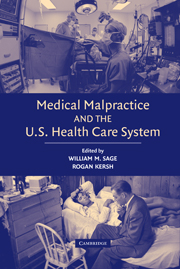Book contents
- Frontmatter
- Contents
- List of Contributors
- Introduction
- PART ONE FRAMING MEDICAL MALPRACTICE AS A HEALTH POLICY ISSUE
- PART TWO THE HEALTH POLICY IMPACT OF MEDICAL MALPRACTICE
- PART THREE MALPRACTICE REFORMS THAT SOLVE THE RIGHT PROBLEMS
- 8 Promoting Fairness in the Medical Malpractice System
- 9 Caps and the Construction of Damages in Medical Malpractice Cases
- 10 Expertise and the Legal Process
- 11 Disclosure and Fair Resolution of Adverse Events
- PART FOUR IN SEARCH OF A “NEW PARADIGM”
- Bibliography
- Index
10 - Expertise and the Legal Process
Published online by Cambridge University Press: 10 December 2009
- Frontmatter
- Contents
- List of Contributors
- Introduction
- PART ONE FRAMING MEDICAL MALPRACTICE AS A HEALTH POLICY ISSUE
- PART TWO THE HEALTH POLICY IMPACT OF MEDICAL MALPRACTICE
- PART THREE MALPRACTICE REFORMS THAT SOLVE THE RIGHT PROBLEMS
- 8 Promoting Fairness in the Medical Malpractice System
- 9 Caps and the Construction of Damages in Medical Malpractice Cases
- 10 Expertise and the Legal Process
- 11 Disclosure and Fair Resolution of Adverse Events
- PART FOUR IN SEARCH OF A “NEW PARADIGM”
- Bibliography
- Index
Summary
As other contributions to this volume demonstrate, some approaches to the malpractice crisis would remove medical liability claims from the civil justice system – for instance, by employing alternative dispute resolution or by instituting an administrative claims system. When considering such measures, it is important to assess whether the present litigation system could be improved. Arguably, if enhancements are feasible, then it is the enhanced system against which alternative possibilities should be measured.
Each stage of litigation provides opportunities for reform. Certificate-of-merit requirements could alter the choices made by some plaintiffs' lawyers when deciding whether to assert a claim. Judicial training could improve judges' supervision of the pretrial process and their resolution of cases prior to trial on motions for summary judgment. Jury reforms could refine the jury's ability to assess liability and determine damages. And a heightened remittitur standard could empower judges to decrease the variability of jury awards, particularly in the area of noneconomic damages.
PLAINTIFFS' LAWYERS AND THE DECISION TO SUE
Though many valid medical liability claims are never brought, some claims that are asserted turn out to be weak. Specialist medical malpractice attorneys are relatively unlikely to bring weak suits, but nonspecialist plaintiffs' lawyers may sometimes do so. Certificate-of-merit requirements, which require the plaintiff's lawyer to consult a medical expert at the outset, may help filter out insubstantial claims.
To bring a claim, the plaintiff must obtain representation.
- Type
- Chapter
- Information
- Medical Malpractice and the U.S. Health Care System , pp. 173 - 190Publisher: Cambridge University PressPrint publication year: 2006



